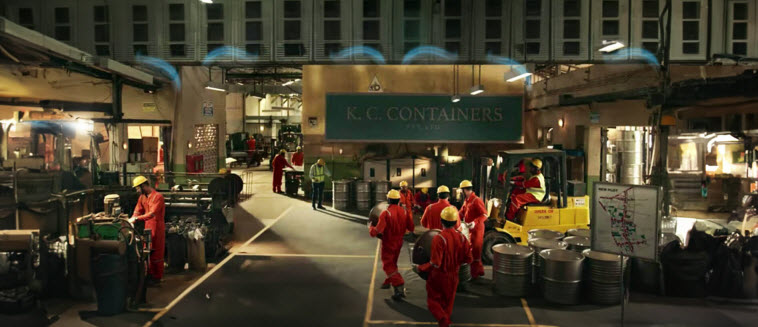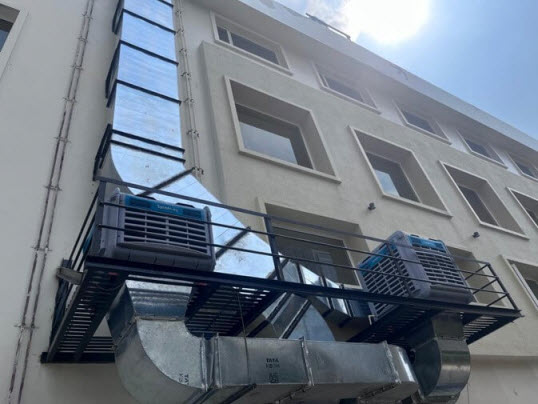Challenges of Industrial Heat Management and Effective Cooling Solutions

Manufacturing industries generate excessive heat, impacting product quality, machinery efficiency, and worker safety. Traditional cooling methods are expensive and inefficient for large industrial spaces. Symphony’s Large Space Venti Cooling (LSV) offers an eco-friendly, cost-effective cooling solution tailored to industry needs.

Cooling Needs in the Plastic Industry
Challenges Due to Heat
- Machine Overheating: Extrusion and molding processes operate at 180°C–300°C, causing inefficiencies.
- Product Quality Issues: Excess heat causes warping, shrinkage, and surface defects.
- Equipment Wear: High temperatures shorten machine lifespan and increase downtime.
- Worker Safety: Heat leads to fatigue, dehydration, and reduced productivity.
- High Energy Costs: Conventional cooling is expensive and energy-intensive.
How Can Symphony LSV Assists Plastic Industry?
- Prevents overheating, ensuring smooth production.
- Maintains stable temperatures, reducing defects.
- Extends machine life, minimizing maintenance costs.
- Improves air circulation, creating a safer workspace.
- Uses 90% less electricity than traditional cooling.
Cooling Demands in the Rubber Industry
Challenges Due to Heat
Rubber Degradation: Excess heat alters flexibility, causing cracks and poor durability. Machine Downtime: Mixers and molding machines overheat, leading to frequent failures. Unsafe Work Conditions: High temperatures increase worker fatigue and exposure to toxic fumes.- Rubber Degradation: Excess heat alters flexibility, causing cracks and poor durability.
- Machine Downtime: Mixers and molding machines overheat, leading to frequent failures.
- Unsafe Work Conditions: High temperatures increase worker fatigue and exposure to toxic fumes.
How Does Symphony Large Space Venti-Cool Help?
- Maintains stable curing temperatures: ensuring quality.
- Prevents equipment overheating: reducing maintenance needs.
- Enhances air circulationimproving workplace safety.
- Reduces energy consumption, offering cost-effective cooling.
Cooling Needs in Steel & MS Plants
Challenges Due to Heat
- Extreme Heat: Furnaces and rolling mills generate temperatures above 1000°C.
- Worker Safety Issues: Prolonged exposure causes heat stress, dehydration, and fatigue.
- Equipment Overheating: Machinery performance declines due to excessive heat buildup.
How Do Symphony Industrial Coolers Help?
- Improves air circulation, reducing heat impact.
- Lowers ambient temperature, enhancing worker safety.
- Minimizes equipment overheating, ensuring continuous production.
Cooling Needs in the Paper Industry
Challenges Due to Heat
- Excessive Moisture Loss: High temperatures cause paper shrinkage and brittleness.
- Machine Overheating: Dryers and rollers generate heat, leading to frequent breakdowns.
- Worker Discomfort: Poor ventilation results in stuffy and unsafe working conditions.
How Venti-Cool Can Help Paper Industry?
- Maintains optimal humidity, preventing paper defects.
- Keeps machinery cool, reducing maintenance needs.
- Improves ventilation, ensuring a comfortable workspace.
Cooling Needs in Machine Tool Factories
Challenges Due to Heat
- Precision Issues: Excess heat causes tool expansion, affecting machining accuracy.
- Equipment Wear: CNC machines and lathes suffer from thermal strain.
- Workplace Heat Buildup: Poor ventilation leads to worker discomfort.
How Does Symphony LSV Helps?
- Controls temperature, ensuring machining precision.
- Reduces machine stress, extending equipment life.
- Enhances air circulation, improving worker productivity.
Conclusion
Symphony’s LSV industrial air coolers provide efficient, cost-effective cooling across plastic, textile, rubber, steel, paper, machine tool, and automobile industries. They enhance product quality, machine efficiency, and worker safety while consuming significantly less energy than conventional cooling systems.
FAQs - Air Handling Units (AHUs) in Venti Cooling
To prevent machine overheating, product defects, and worker discomfort.
By regulating temperature, reducing equipment wear, and improving workplace conditions.
Yes, they consume up to less power as compare to AC system and provide eco-friendly cooling.
By controlling heat buildup, ensuring precision, and reducing maintenance costs.
They offer cost savings, better efficiency, and a sustainable cooling solution.


